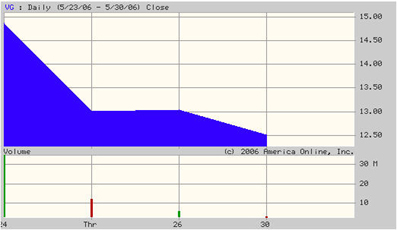Vonage's future: gradual share price declines, strategic moves, return to private equity


Yesterday, Vonage stock dipped to $12.50 a share-a more than 25 percent loss from last Tuesday's $17 a share IPO price.
I've seen mountains with less steep declines.
Because those investors more affected by uncertainty have already attempted to bail, I sense that Vonage share prices aren't going to tumble all that much more for awhile. Given Vonage's subscriber base, expenses, and potential, I sense a gradual inching down toward around $10 a share. That will probably take a couple of weeks.
Once the stock is at that point, I believe Vonage will undertake some highly publicized initiatives to stem the decline and even bring the stock back a bit.
I see a five-pronged strategy that will involve:
A partial stock buyback. This will be done to prop up the stock price by attempting to create the psychological impression that the company and its backers are confident.
Introduction of enhanced tools. We are going to see Vonage incorporate call-quality and call management suites into their consumer-grade product. This will be done via contracts with preferred vendors. These tools will be incorporated to try and make some meaningful inroads into the SME sector, as well as to introduce another point of differentiation between Vonage and competing consumer-caliber VoIP services.
Introduction of IM. I believe that Vonage will introduce IM into their Vonage SoftPhone, and quite likely into the Vonage control panel as well. This would allow for back-channel communications during Vonage calls.
Partnership with independent Telecommunications Companies. Unable to play the bundling game like archrival major telcos and cable broadband providers, Vonage will contract out their VoIP services to small, independent landline telcos, cell carriers, WiFi and WiMAX providers, and small cable companies. This might even be done in a "white label" model where suscribers of these smaller companies can get VoIP service provided by Vonage- but not labeled as such.
Long-term customer contracts. Cellphone carriers ensure cash flow and maintain investor confidence by locking their customers up with two-year service contracts. In an effort to reduce churn, Vonage will do this as well. These arrangements won't be mandatory, but will be pitched to the customer as a discounted money saver. For example, a $24.99 plan under a two-year contract might be discounted to, say $19.99.
I think these steps may offer some encouragement to investors, but all they will do is slow down the slide. When it becomes obvious that meaningful net neutrality will not be enacted during this Congress, that is going to lop a point or two off Vonage's price.
I'd also look to quarterly fiscals as well as the results of this year's U.S. election cycle to provide further pricing guidance. If the fiscals- due in October, I believe- bleed red, and the party in power (known for its opposition to net neutrality) retains control of Congress, I'd look for Vonage to be down to between $6-8 a share by November.
It will be at that point that Vonage may gain urgent cachet as an acquisition target. While it would be most suitable for SprintNextel to buy Vonage, everything I am picking up indicates to me that company is more willing to contract out VoIP service packages rather than buy their own solution. A more attractive valuation might change SprintNextel's mind, but I cannot say they are wired to strategize that way.
More likely than not, a substantial diminution of Vonage's stock would probably result in a substantial acquistion by private equity, and the company once again being in private hands.